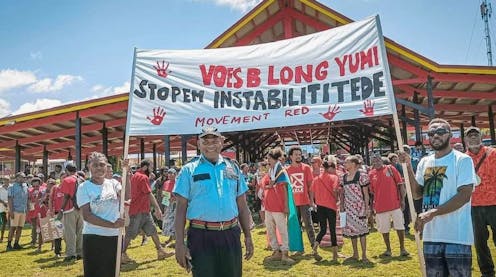Source: The Conversation (Au and NZ) – By Kolaia Raisele, PhD candidate, youth leadership in the Pacific, La Trobe University

Vanuatu’s young people are tired of political instability. And they are not just sitting back as political spectators, they’re actively pushing for reform and are determined to steer their country towards stability and prosperity.
Their activism is centred around a crucial national referendum being held today, which is aimed at creating a more stable government. If approved, the referendum would lead to important changes meant to reduce the political instability caused by MPs often switching parties.
Political instability has wracked Vanuatu since it gained independence in 1980, severely affecting its governance and public trust in its institutions.
In recent years, this turmoil has intensified. In 2023, for example, the country cycled through three different prime ministers in a month due to successful no-confidence votes.
One of these no-confidence votes in November meant that many important bills, including the 2024 budget, were not able to be passed.
This is what prompted ni-Vanuatu youth to form “Muvmen blong Red” (or Movement Red) last year. The movement is aimed at creating a future in which the government is more responsive to the people and adept at tackling key livability issues, such as improving roads, reducing food prices, offering assistance to young people looking for work, improving health care and helping communities hit by cyclones to rebuild.
Putting an end to the rampant party-switching among MPs will help toward this goal. Young ni-Vanuatu believe this practice undermines the integrity of the political process and leads to short-lived policies that fail to address the long-term needs of the country.
For example, during my fieldwork in Vanuatu last year, the country was without a minister for youth and sports for a few months – a direct consequence of these frequent government changes. This significantly hampered the ministry’s work – provincial youth officers told me their funds had been delayed or redirected as a result.
Furthermore, my conversations with young people from the outer islands revealed a deepening distrust in the government. This was largely due to MPs frequently switching sides in parliament, which many people felt led to a neglect of their needs and interests.
What is the referendum asking?
One major step forward was the approval of the Political Parties Registration Act in December, which was strongly supported in parliament.
This law requires all political parties to officially register and follow strict financial reporting rules, similar to those of private entities and NGOs, with oversight provided by the Election Commission. These measures are designed to make the government more stable, ensure election results are followed, and reduce the formation of temporary political parties without clear platforms.
Parliament also passed a separate act that would amend the constitution with two new articles aimed at ensuring politicians stay true to their duties.
Article 17A would require that MPs who are elected as part of a political party to stay with that party for their entire time in office. If they leave the party or are kicked out, they will lose their seat in parliament.
Article 17B applies to independent candidates and members of single-member parties. After an election, they must join a larger political party and support that party during their term. If they don’t, they will also lose their seat.
For these amendments to come into effect, they now need to be approved through a national referendum. More than 200,000 registered voters are able to take part in Vanuatu and overseas. It’s the first referendum of its kind to be held in the country.
Opposition MP Ishmael Kalsakau, who had been ousted as prime minister last year, argued for the referendum to be delayed, saying it was more important to look at the root cause of political instability before amending the Constitution.
What this moment means
As Vanuatu has been gearing up for this monumental event, there’s been a real buzz among the youth and wider community.
The “Movmen blong Red” group has been very active in the campaign, using social media, public meetings and peaceful protests to educate the public on the importance of the referendum. They have also been working with national leaders, which marks a significant move towards a more inclusive government.
The referendum isn’t just about changing laws – it’s about young people, in particular, stepping up to shape their nation’s path forward. They’re not just hoping for better governance, they’re actively participating in creating it.
This is a pivotal moment for Vanuatu, showing just how powerful a united, informed public can be in steering their country towards a more stable future.
![]()
Kolaia Raisele works for La Trobe University. He receives funding from the Department of Social Inquiry at La Trobe University.
– ref. Vanuatu is holding its first-ever referendum – here’s what’s at stake – https://theconversation.com/vanuatu-is-holding-its-first-ever-referendum-heres-whats-at-stake-228192





